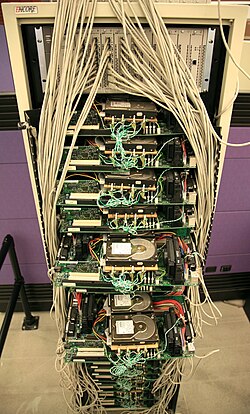A Message from Tim Berners-Lee, Inventor of the World Wide Web
Thank you very much!
"Twenty-five years ago today, I filed the proposal for what was to become the World Wide Web. My boss dubbed it ‘vague but exciting’. Luckily, he thought enough of the idea to allow me to quietly work on it on the side.
In the following quarter-century, the Web has changed the world in ways that I never could have imagined. There have been many exciting advances. It has generated billions of dollars in economic growth, turned data into the gold of the 21st century, unleashed innovation in education and healthcare, whittled away geographic and social boundaries, revolutionised the media, and forced a reinvention of politics in many countries by enabling constant two-way dialogue between the rulers and the ruled.
There are a few principles which allowed the web, as a platform, to support such growth. By design, the Web is universal, royalty-free, open and decentralised. Thousands of people worked together to build the early Web in an amazing, non-national spirit of collaboration; tens of thousands more invented the applications and services that make it so useful to us today, and there is still room for each one of us to create new things on and through the Web. This is for everyone." - http://www.webat25.org/ (in image: The first web server, used by Tim Berners-Lee. Photo via Wikipedia).
Ref.: Google, Official Blog, On the 25th anniversary of the web, let’s keep it free and open - http://googleblog.blogspot.ro
- Los Angeles Times, Salvador Rodriguez, World Wide Web proposal was submitted 25 years ago today - http://www.latimes.com/
(In Romanian)
De-a lungul vremii, în toate domeniile ştiinţifice se schimbă teoriile, metodele şi tehnicile de investigaţie, de
aceea dinamica cunoaşterii umane influenţează dezvoltarea generală a societăţii umane. Pentru a obţine
evoluţie şi eficienţă în viaţa sa, omul trebuie să se adapteze continuu la aceste schimbări ale cunoaşterii. În domeniul educaţiei, şi în special al învăţării şi al perfecţionării, apariţia de noi tehnologii ale informaţiei şi comunicării (TIC), îmbunătăţirea teoriilor pedagogice şi psihologice, obligă pe elevi/studenţi, profesori, părinţi şi pe specialişti, să se adapteze la aceste schimbări. (in image: Google's First Server, 1998)
1990 vs. 2014, NU existau, dar astăzi există:
www, web technologies, web programming, web server, router, proxy, spider,e-mail, HTML, XML, PHP, URL, My SQL, DNS, DHCP, cookie, .com, .edu,
.ro, .eu, link, Google, Facebook, Yahoo, Mozilla, Chrome, chat, skype, Yahoo!, messenger, twitter, SMS, RSS, BBS, CSS, SSL, SSH, Firewall, Page rank algorithm, e-learning, Web 2.0, Learning 2.0, Tools 2.0 (Google drive, wikis, social networks), educational software, virtual learning, e-commerce, e-training, e-portfolios, e-rubrics, iPhone, iPad, SmartPhone, Tablet PC, Android OS, Blackberry, Cloud computing, Touch technology, interactive table, digital blackboard, online journal, online courses, digital library, Dropbox, Nong, Google groups, open source, PDF, CMS, LMS, Flash, Dreamweaver, Photoshop, Podcast, Moodle, Drupal, Joomla!,Wikipedia, wiki, blog, Java, JavaScript, Windows OS, Linux, Azure platform.



No comments:
Post a Comment
Note: Only a member of this blog may post a comment.